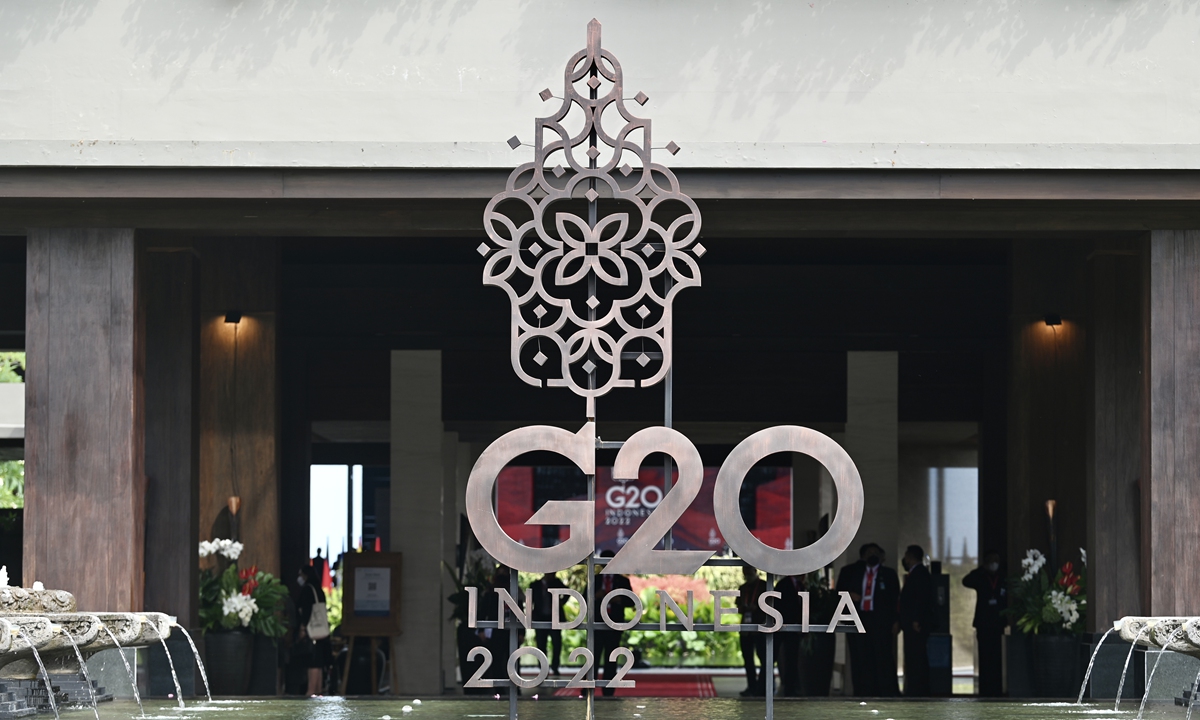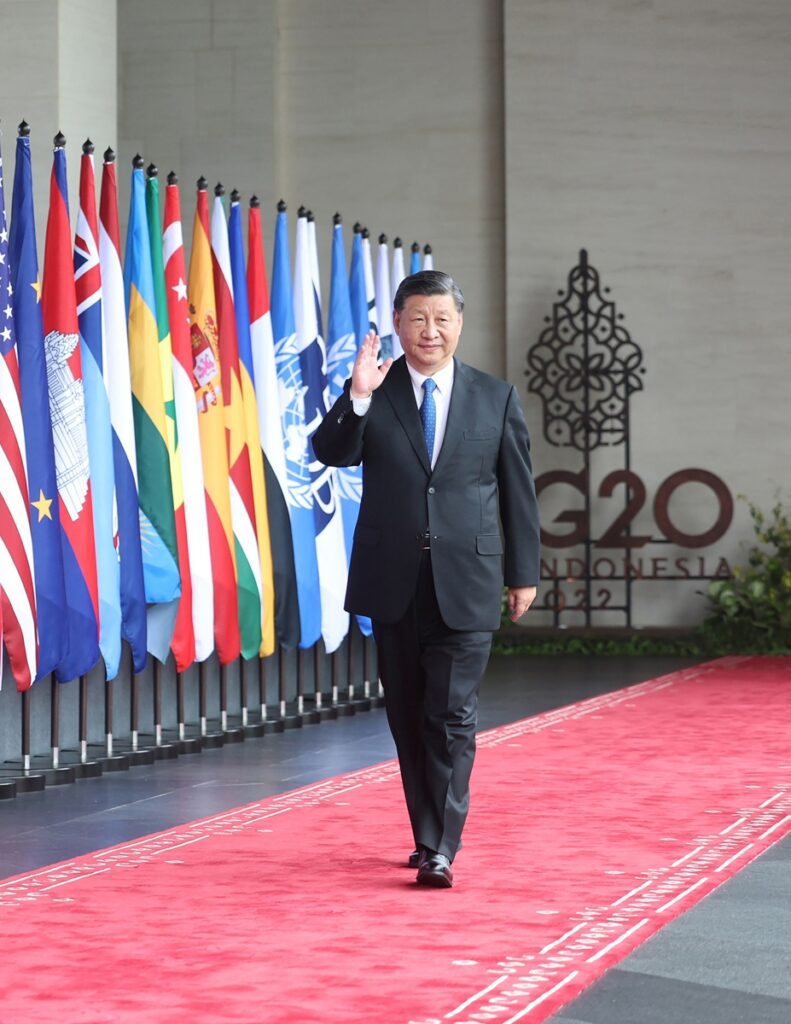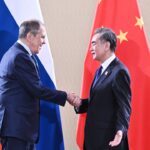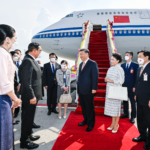Observers said that the Chinese top leader’s speech offers a guide for the world to overcome global challenges including food and energy crises when many countries worldwide are under the threats of hegemony, unilateralism and bloc confrontation.
The G20 summit kicked off on the Indonesian resort island of Bali on Tuesday morning. After having arrived at the main venue for the summit, greeted by Indonesian President Joko Widodo, world leaders started the first working session, which focused on global food and energy security, as part of Indonesia’s plan for the summit to focus on the global economic recovery amid a slew of challenges.
The world at this moment truly needs major countries to take responsibilities to unite the international community and help the world overcome crises and realize recovery, experts said.
When the US is facing intensifying partisan struggles and polarization at home and keeps seeking hegemony abroad, the EU is being damaged seriously due to the Ukraine crisis and other problems. So China, a major power with credible strength and global influence, is guiding the world to get out of the current crises, and Xi’s speech is offering China’s answers to the questions shared by the world, experts noted.

G20 Photo:VCG
Stressing unity, solidarity
In his speech, Xi said, “We meet at a time of momentous changes unseen in a century, changes that are consequential to the world, to our times, and to history. The COVID-19 pandemic still drags on with cases surging here and there. The world economy is getting more fragile. The geopolitical environment remains tense. Global governance is seriously inadequate. Food and energy crises are compounded with one another. All this poses formidable challenges to our development.”
Xi said all countries should replace division with unity, confrontation with cooperation, and exclusion with inclusiveness. All countries should join hands together to answer the question of our times – “What is wrong with this world, what we should do about it” – so as to tide over difficulties and create a better future together, Xi remarked.
Li Haidong, a professor from the Institute of International Relations at the China Foreign Affairs University, told the Global Times on Tuesday that “the unity of international community is under threat from some countries which have attempted to further divide the world in accordance with ideology, to replace the international rules with their own hegemonic rules, and to utilize globalization to serve a group of countries rather than the vast majority of the international community.”
Analysts named the US and some of its close followers, saying their military expansion has brought bloc confrontation and conflicts to Europe, making Russia, Ukraine and the EU to suffer from the crisis. The US-led bloc launched unilateral sanctions which further damaged the supply chain, coerced more countries to follow suit, and formed cliques to contain the development of its competitors, especially China.
All of these are damaging the unity of the international community.
Highlighting the tension between the major powers, many reporters covering the G20 summit in Bali were focused on whether world leaders will reach a communique or whether they will even pose for a group photo.
Despite the tension, many world leaders also called for global cooperation and affirmed opposition to geopolitical conflicts during the summit.
Xi called for making global development more inclusive, resilient and beneficial to all.
At the working session on Tuesday morning, Indonesian President Widodo told world leaders that “we shouldn’t divide the world into parts. We must not let the world fall into another cold war,” according to Bloomberg.
Other world leaders also warned the dire consequences of division and protectionism for the global economy. Kristalina Georgieva, managing director of the IMF, said that protectionism must not be allowed as it’s leading the world to drift into separate blocs. She warned that a divided world would forfeit at least 1.5 percent of GDP annually, Bloomberg reported Tuesday.
At the meeting with Xi in Bali on Tuesday, French President Emmanuel Macron said France upholds independent diplomacy and opposes bloc confrontation. In the face of the current turbulent international situation, France hopes to continue upholding the spirit of mutual respect, equality and reciprocity with China, Macron said.
The Chinese president’s call for unity and inclusive global development was also well received by global experts.
Selcuk Colakoglu, director of the Ankara-based Turkish Center for Asia-Pacific Studies who also attended some G20 sessions, said that China has played a very responsible role to prevent a major fracture in the world economy since the beginning of the pandemic and as a leading trade country, China plays a very important role in global supply chains.
“Xi’s three-point proposal consisted of an inclusive, universally beneficial and resilient global development plan and indicates a concrete road map to boost global sustainable development,” Colakoglu told the Global Times on Tuesday.
Cooperation over division
In his G20 speech, Xi said that food and energy security are the most pressing challenge in global development. The root cause of the ongoing crises is not production or demand, but interrupted supply chains and international cooperation.
Xi said that we must resolutely oppose the attempt to politicize food and energy issues or to use them as tools and weapons, adding that unilateral sanctions must be removed, and restrictions on relevant scientific and technological cooperation must be lifted.
Wang Yiwei, director of the Institute of International Affairs at the Renmin University of China, told the Global Times that the international cooperation at this moment requires solidarity and real multilateralism. The US claimed that it embraces multilateralism, but its “rules-based order” is actually challenging the international order with the UN at its core, and its sanctions and long-arm jurisdictions, as well as “decoupling” approaches to reduce interdependence with China, are all against true multilateralism.
More and more countries around the world, such as Saudi Arabia, Brazil, Germany, France, Argentina, India and Turkey, have shared similar feelings that the US is trying to dominate the world order but failed to deliver benefits to everyone, only making troubles and transferring pressures to other countries. This is the reason why they are all considering not following Washington too close, some have even started to say no to the US, experts said.
If the international community cannot make the US to correct its mistakes, then the countries have the right to decide their own destiny, and to unite with one another to fix the damaged supply and industrial chains in order to deal with crises together and realize joint development, analysts said.
During his speech, Xi said, “The Global Development Initiative (GDI) that I proposed is aimed at meeting the long-term objective and immediate needs of common development of the world, fostering international consensus on promoting development, cultivating new drivers for global development, and facilitating common development and progress of all countries.”
Within one year, more than 60 countries have joined the Group of Friends of the GDI. China has established the Global Development and South-South Cooperation Fund, and will increase its funding for the China-UN Peace and Development Fund, Xi said.
On handling the food and energy crises, Xi said, “This year, China has proposed, together with six partners including Indonesia and Serbia, the Initiative of International Cooperation on Resilient and Stable Industrial and Supply Chains, joined other countries in calling for the establishment of the Global Clean Energy Cooperation Partnership, and put forward the International Cooperation Initiative on Global Food Security in the G20. We look forward to deepening cooperation with all parties in these areas.
Chinese analyst said that China, as a major power with strength, capability and influence, is working with other countries to solve shared problems, and more and more countries have been motivated and convinced to join the cooperation for building a community with a shared future for mankind together, and in the future, such kind of cooperation will be further increased and globalization will be reformed and improved with the efforts made by China and its partners.




